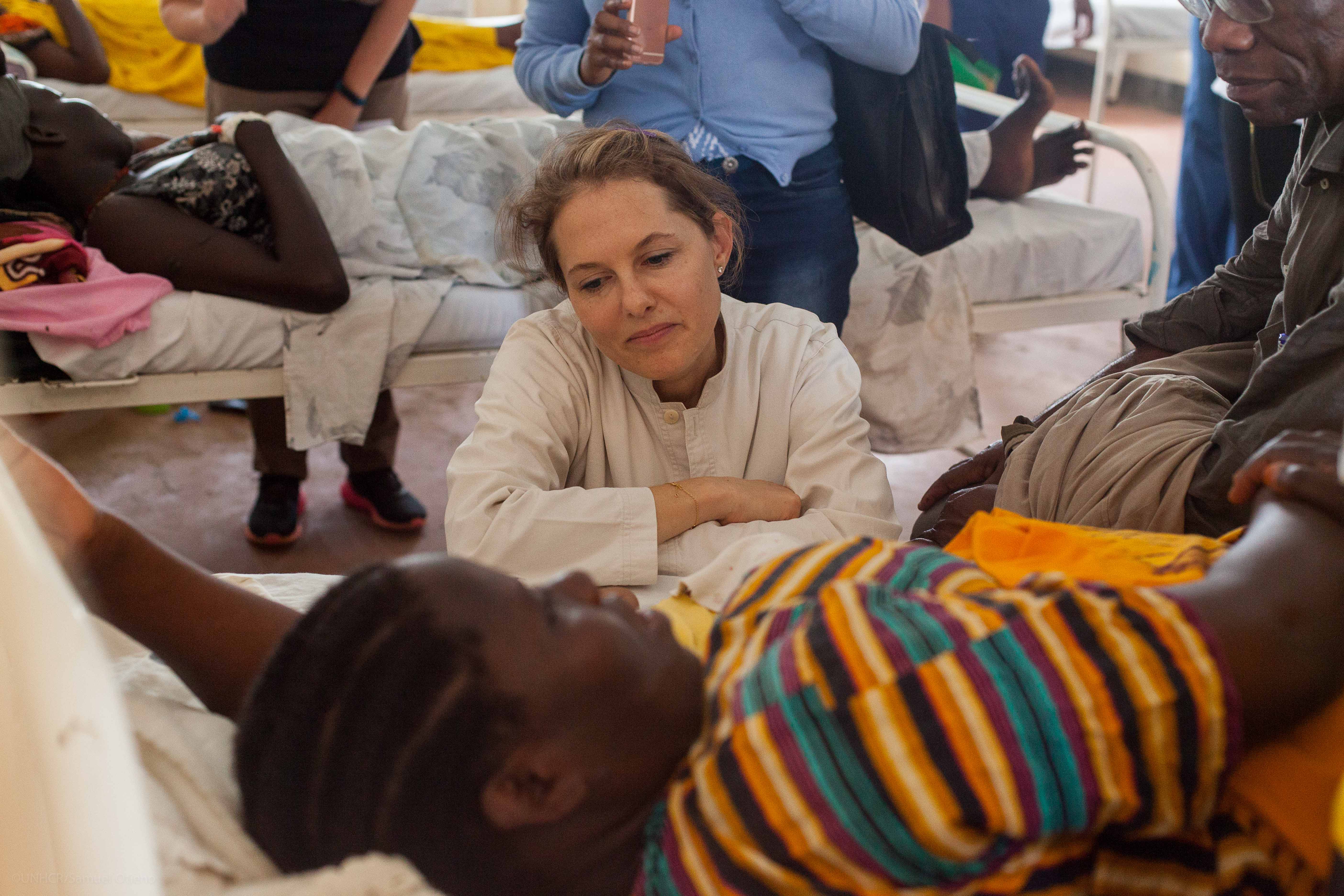HRH Princess Sarah reflects on how forced displacement is affecting the country’s youngest and most vulnerable.

HRH Princess Sarah Zaed of Jordan inteacts with a Somali Woman who just delivered a baby at IRC hospital in Kakuma 4. UNHCR/S.Otieno
It was humbling, on the eve of the fourth anniversary of the outbreak of conflict in South Sudan, to meet with the people who are worst affected. Of the 2.1 million refugees forced to flee the violence, a staggering 85% are women and children.
A further 7 people million inside the country are in critical need of humanitarian assistance, including 2 million who are internally displaced.
Tragically, indications are that people will continue to flee into neighboring countries with refugee numbers approaching the three million mark by the end of 2018. Such a scenario will doubtless involve further internal displacement alongside increasing destitution across the country where people’s resilience is already grossly undermined by bloodshed, drought and growing food insecurity.
It is against the backdrop of these dreadful realities and grave concerns that I travelled to South Sudan and Kenya, at the request of UNHCR and in my capacity as an Advisor to the High Commissioner on Gender, Forced Displacement and Protection. South Sudan was chosen because, despite the shocking levels of need, it has become a “forgotten emergency”.
South Sudan ranks among the fastest growing refugee situations in the world, with numbers swelling by an average of 500,000 people per year since 2013. Yet humanitarian funding for the crisis has declined by 10 per cent per year during the same period.
The resulting dichotomy has left a majority of the refugees on the brink, barely able to survive without external aid. During my four-day visit, I was able to glimpse the devastating impact on the most vulnerable—the women, their newborns and children.
In South Sudan, I visited refugees in Mabaan County, Upper Nile State. In the 24 hours before my visit to the Mabaan Hospital, seven sets of twins were born! The mothers and newborns were in good health because they had been able to access quality pre-natal and hospital delivery services. There was no explanation for the bounty of double births; it was “twin season”, I was told.
Meanwhile, in Kakuma refugee camp in northern Kenya a few days later, I visited a maternity hospital that has on average 400 deliveries per month. Tragically – unacceptably – the night before my arrival, two premature newborns died because the facility lacked basic equipment and expertise which would have kept them alive, and saved their mothers from grief.
While largely encouraged by the efforts and contributions making it possible for women to experience safe deliveries and high rates of infant survival, what future was ahead for these children and their mothers? Mere survival cannot be the objective; rather the beginning of a life of health, well-being, education, dignity and security should be the future for the citizens of the world’s newest nation.
Another generation of South Sudanese children is growing up in exile, condemned to the fringes of society and denied the basic ingredients needed to thrive in a modern world, like proper education, good nutrition, and training as well as job opportunities.
From the outset, the odds are stacked against refugee adolescents and youth. Chronic underfunding deprives the majority of their only chance to get past the harrowing experiences that brought them to exile. More than 50% of the 1.3 million South Sudanese refugee children were not in school in 2017, increasing their vulnerability to risks like forced recruitment, defilement, teenage pregnancy, child marriage, and recourse to survival sex. Primary schools are overcrowded and very few children and youth can access secondary education or find meaningful employment.
The demeanor of the older children — the adolescents and the youth that I met — brought home the hopelessness that characterizes exile. Even as they aspire to be doctors, pilots and teachers, and to provide for their families, they were keenly aware of the almost nonexistent opportunities for their success – for themselves, their families and their community.
A listless teenager with a drawn expressionless face and a timid voice, in response to my question about life in the camp, answered with a choked “It is too hard.”
Though my visit was short, I came away with the strong and urgent conviction that much more can and must be done to alleviate the difficulties refugees are facing, and that no effort must be spared to end the conflict which has condemned them to adversity and exile.
The international community has an obligation to do everything we can to promote peace; protect and empower affected populations – both refugees and host communities; and partner with host governments, donor governments, regional institutions and the private sector.
Four years of conflict have left the world’s youngest nation in peril, with a destabilizing effect on the neighboring countries. In the spirit of the New York Declaration, we must urgently address the drivers of the conflict and create conditions for women, men, girls and boys to live in dignity at home and in exile.
South Sudan must not be forgotten. Every crisis is important, because every life is important.
HRH Princess Sarah Zeid is an Advisor to the UN High Commissioner for Refugees on Gender, Forced Displacement and Protection, and a Global maternal and newborn health advocate. Follow her on Twitter: @PrincessSarahZR
Share on Facebook Share on Twitter